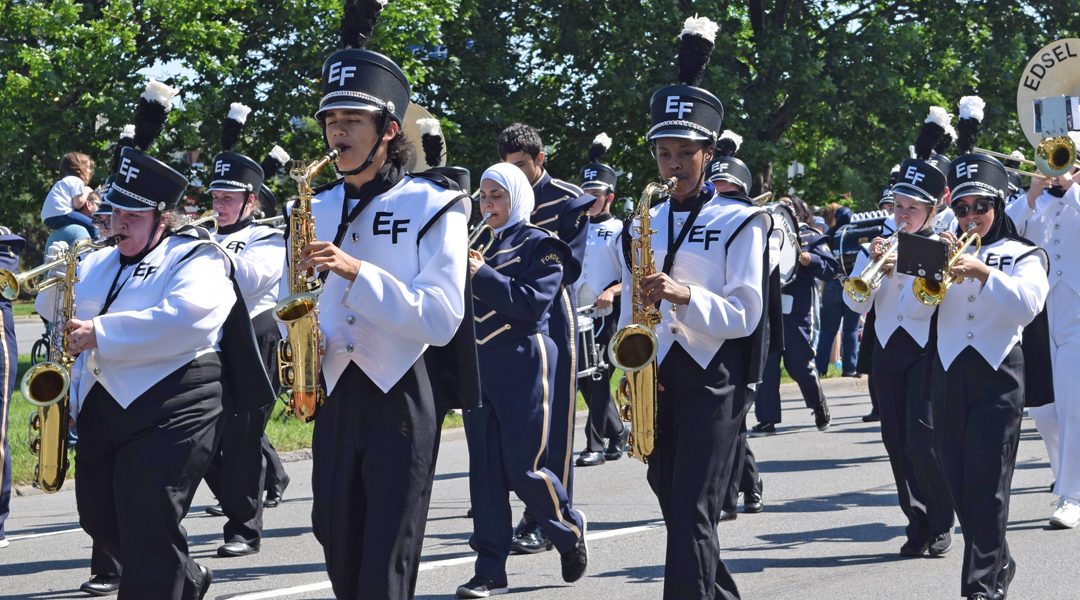Editor’s Note: This article is fiction, written to help us imagine what life could be like after the threat of Coronavirus is no more.
It was 10 am in Dearborn on a hot and humid day when Michigan Avenue was filled to the brim for the first time in months. Throngs gathered on the sidewalks with the most peculiar behavior. Women in hijab kissed each other on the cheeks and held each other’s hands, laughing as they walked down the street together. Men who were strangers walked up and shook hands, telling the same joke or saying the same phrase every time it happened. Every time they thought it was just as clever as the last, and nothing could stop their happiness. Elders cried as they hugged a young person from their family, or some child from their neighborhood, at last feeling that deep need fulfilled, as they remembered what it was like when one generation holds another in its arms.
The marchers began, and people stood up from their lawn chairs and began screaming. It wasn’t a cheer or a hurrah, or a shout. A scream. A kind of primal need to shear every last atom of air through one’s vocal chords, to blow the volume out from one’s belly until all one could hear was the engine roar of voices. It was an insane, wild, uninhibited scream, a sound that had wound up like a steel coil for months, held in place, buried into the ground and suffocated as we held our own breath, fearful of everyone and everything, but most of all fearful of the encroaching threat of disease and death. It was the sound of release. Drums were beaten and horns bellowed as the parade began, but nothing could match the sound of the screaming. As the first marchers came into view, the scream transformed, from the wild release of inhibition, to one of gratitude. It was the scream of those who see their heroes emerge from a victorious battle, at last.
Some were still wearing their stethoscopes. Others waved surgical masks and respirators in their hands. The doctors and nurses walked down the street, with big signs carried along the front. “Henry Ford.” “Beaumont.” Urgent Care. The VA. One procession after another and the screaming never stopped. A little girl in a frilly dress walked up and handed out chocolates to the medical professionals who walked by. The sound of the screaming, the cheers, was so loud that there was no room for words. Some of the healthcare professionals cried as they walked, so moved by the waves of cheers and ululations of the crowd. Someone broke into a chant, “We love you.” And then it stretched out, almost into a song, “We loooove you.” And the crowd’s chant broke off into bashful laughter, and then more shouts and screams of joy. “Thank you!” “God bless you!” “You’re my hero!”
Then came the march of the first responders. The crowd cried waves of sonorous joy as the ambulances moved down in parade alongside firefighters and paramedics. The ambulances that saved so many lives, whose sound once inspired fear and sadness, as neighbors looked out their windows, praying, hoping from a distance, and sad – deeply sad they weren’t able to walk out their door and ask the family of those who were sick what they could do, or how they could help. People were ashamed to keep their distance when others needed comfort. The isolation brought so much shame. But they had to. When the police officers walked down, they walked down with their families, some of whom they had not seen for weeks on end. People remembered hearing how they had to be quarantined, time and again, after dealings with those who had the virus, living in constant anxiety of every contact with a citizen, but going out to work every day despite their deep, and very real, fears.
Delivery drivers were the strangest sight. Uber, Amazon, all of the names were walking. They were there, scruffy, strange looking, not the leading men or women of this movie, but a supporting role that no one could deny played a part. Everyone had a memory, a story to tell, where some thing appeared at their door that they needed, some bit of food, some item that helped them make it through. And these men and women, some of whom drove their cars down the street and honked as the crowd waved, risked their lives, too, every day, to bring us what we needed, while they took meager pay.
Terrible sadness filled the air as the politicians walked down, because in their hands they held the wreaths. What once was a roar of sound halted to silence even graveyards do not know. On the wreaths, each flower represented a life. One life lost to the virus, our silent, invisible enemy, who filled us with terror each time we visited the grocery. Every person a possible carrier, every surface a possible place to pick it up. The politicians carried those lives down the street like a ship carries an anchor. They didn’t walk purposely slow, but to the crowd, their every step was a lifetime. A deep bell rang behind them, and in its echo we heard the voices of those we lost.
When the procession ended in front of the library, the wreaths sat down in a place where it was announced a small monument would soon be laid, a monument to those who lost their lives in this horrible time. Veterans saluted, and the star spangled banner was played.
As afternoon turned to night, an explosion of activity occurred on the streets. Loud music played on every corner. Every bar, smoke shop, hookah lounge and restaurant was filled to the brim. The loudness and joy of the crowds were insatiable. As the night waxed on men and women cried together as they told stories of their long isolation, of their pain, of what it felt like to be gasping for air in their bed and there was nothing anyone could do. And yet they still hugged each other, kissed each other, held hands and kept close to one another, as they had not done with their friends, family and loved ones for what seemed like forever, for too long.
The next day, the police released the crime numbers for the previous day. They said there were no assaults or murders, but there were quite a few cases of drunk and disorderly conduct, mostly involving people breaking tables that they danced on, or falling asleep in public after drinking themselves to the point of exhaustion. One man was cited for destruction of property after breaking a glass window with his bare hands. He was using it as a drum while other restaurant patrons danced the dabke, and he and his friends kept beating it louder as the music went on, until the glass shattered. The police arrived on the scene to find people laughing on the floor as a disgruntled lounge worker tried to push them out of the way so he could sweep up the broken glass. One car was reported stolen, but the man of the house called back later to say it was fine, and his son had simply ran off with it, showing back up at 1 in the morning smelling like perfume, with a hickey on his neck and no decent explanation for where he had been. One bicycle was stolen. A waiter got stiffed, but when someone confronted the man he apologized and handed her a $100 bill.


Hopeful! I read it twice and am sure to read it many times more during these dark days. I just asked my daughter to read it and saw the smile appear on her face. She said ” mama, I hope we are able to do this for real”. Oh, what a celebration it will be!! I can almost hear it now Brian and smell the charcoal in the air from all of the grills that will be burning. Yes, hopeful indeed.